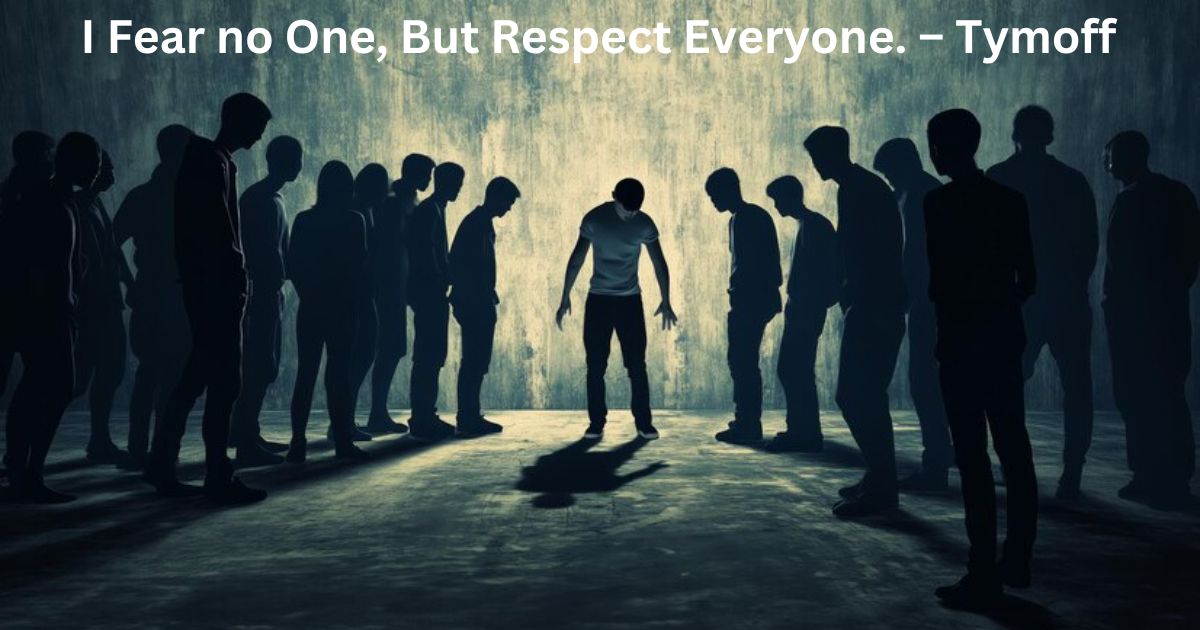Ever wonder how to navigate life’s challenges with both strength and grace? Tymoff’s quote, “I fear no one, but respect everyone,” might just hold the key. This powerful statement isn’t about being fearless in the face of danger or submissive in the presence of others.
It’s about finding that sweet spot between confidence and humility. Let’s dive into what this really means and how it can transform your relationships and outlook on life.
Interpreting the Essence of The Quote
At first glance, this quote might seem like a contradiction. How can you fear no one yet respect everyone? Isn’t respect often born out of a certain level of fear or intimidation? Not quite. Tymoff’s words challenge us to rethink our understanding of fear and respect, suggesting a more empowering approach to life and interactions.
The Meaning of Fearlessness
Fearlessness here doesn’t mean recklessly charging into dangerous situations. It’s about cultivating inner strength and self-respect that allows you to stand firm in your beliefs and values. When you fear no one, you’re less likely to be swayed by others’ opinions or pressures. You become more authentic, more true to yourself.
Think about a time when you stood up for what you believed in, even when it wasn’t popular. That’s fearlessness in action. It’s not about being invincible, but about having the courage to be vulnerable and true to yourself.
The Power of Respect
Respecting everyone, regardless of their status or how they treat you, is a sign of emotional maturity and strength. It’s recognizing the inherent dignity in every human being. This doesn’t mean you have to agree with everyone or like their actions. It means treating them with basic human courtesy and dignity.
Imagine treating the CEO of your company and the janitor with the same level of respect. That’s the power we’re talking about here. It creates an environment of mutual understanding and cooperation, paving the way for better relationships and outcomes.
Why Fear and Respect Don’t Have to Compete
Often, people mistake fear for respect. They think that if others fear them, they’ll automatically respect them too. But fear and respect are two very different beasts, and understanding this difference is crucial for personal growth and healthy relationships.
The Risk of Using Fear for Respect
Using fear to gain respect is like building a house on sand. It might work for a while, but eventually, it’ll crumble. Fear-based relationships, whether personal or professional, are unstable and often lead to resentment and rebellion.
Remember that boss who ruled with an iron fist? How did that work out in the long run? Probably not great. Fear might get short-term results, but it kills creativity, loyalty, and genuine collaboration.
How We Navigate Modern Society
In today’s fast-paced, competitive world, it’s easy to fall into the trap of trying to intimidate others or be intimidated ourselves. But applying Tymoff’s philosophy can be a game-changer in how we approach work, relationships, and personal growth.
Fearless Space in a Competitive Atmosphere
Imagine walking into a high-stakes meeting or a job interview without the paralyzing fear of judgment or failure. That’s what fearlessness can do for you. It doesn’t mean you won’t feel nervous, but you’ll have the inner strength to push through and present your authentic self.
In a work environment, this fearlessness can lead to more innovative ideas, honest feedback, and ultimately, better results. When you’re not afraid to speak up or take calculated risks, you open doors to opportunities you might have otherwise missed.
Respect in Business and Personal Relationships
Respect is the foundation of any healthy relationship, be it personal or professional. In the business world, respecting colleagues, clients, and even competitors can lead to better collaboration, more effective problem-solving, and a positive work culture.
In personal relationships, respect fosters trust, open communication, and deeper connections. It’s about valuing others’ opinions, even when they differ from your own, and treating everyone with kindness and consideration.
Emotional Intelligence
At the core of Tymoff’s philosophy lies emotional intelligence. It’s the ability to understand and manage your own emotions while empathizing with others. Developing emotional intelligence is key to fearlessly navigating life while maintaining respect for all.
Emotional Intelligence Builder
Building emotional intelligence is a journey. Start by practicing self-awareness. Pay attention to your emotional reactions in different situations. Then, work on empathy by trying to see things from others’ perspectives. Lastly, focus on effective communication, expressing yourself clearly while respecting others’ views.
Confidence and Humility — Finding the Balance
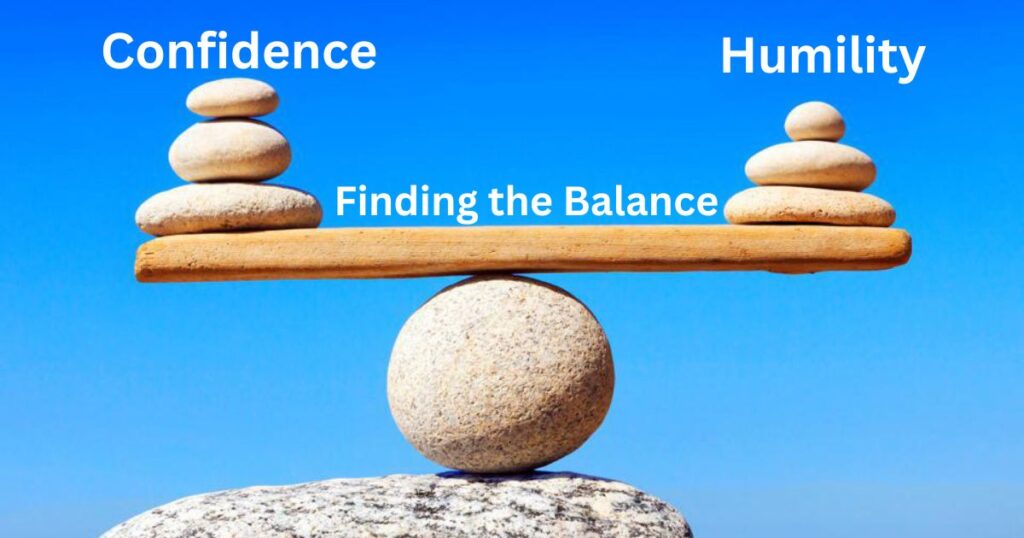
The sweet spot in Tymoff’s philosophy lies in balancing confidence with humility. It’s about being sure of yourself without putting others down, and respecting others without diminishing your own worth.
Confidence Without Arrogance
Confidence is knowing your worth and abilities without needing to prove them to everyone. It’s walking into a room and being comfortable in your own skin, not feeling threatened by others’ success or opinions.
Arrogance, on the other hand, is an inflated sense of self-importance that often stems from insecurity. True confidence doesn’t need to belittle others to feel valuable.
Humility Without Submission
Humility isn’t about thinking less of yourself; it’s about thinking of yourself less. It’s recognizing that everyone has value and something to offer. Being humble doesn’t mean being a doormat. It means being open to learning from others and admitting when you’re wrong.
Practical Applications in Everyday Life
So how do we apply this philosophy in our daily lives? Here are some practical tips:
- Practice active listening: Really hear what others are saying without immediately preparing your response.
- Challenge your fears: Identify what scares you and take small steps to face those fears.
- Show respect in small ways: Use people’s names, say thank you, and acknowledge others’ efforts.
- Embrace vulnerability: Share your thoughts and feelings openly, showing that true strength isn’t about being invulnerable.
The Impact on Personal Growth
Adopting this mindset can have profound effects on your personal growth. When you fear no one, you’re more likely to take risks, try new things, and step out of your comfort zone. This leads to accelerated learning and development.
Respecting everyone opens you up to diverse perspectives and ideas. It broadens your horizons and enhances your understanding of the world and people around you.
Overcoming Challenges in Implementation
Implementing this philosophy isn’t always easy. You might face situations where fear seems the natural response, or where someone’s actions make them hard to respect. In these moments, remember:
- Fear is often based on assumptions. Challenge those assumptions.
- Respect doesn’t mean agreeing with or condoning all actions. It’s about recognizing basic human dignity.
- It’s okay to set boundaries while still maintaining respect.
The Ripple Effect
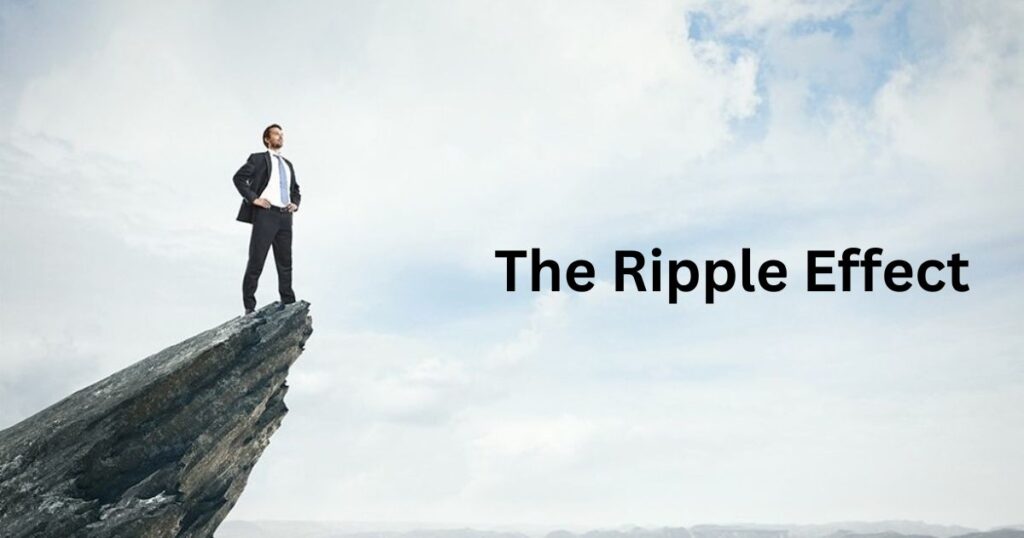
When you embody this philosophy, it doesn’t just change you – it changes your environment. Your fearlessness can inspire others to be more courageous. Your respect can create a culture of mutual understanding and cooperation.
Imagine a workplace where ideas flow freely because no one fears judgment. Picture a community where differences are respected and conflicts are resolved with dignity. That’s the power of this mindset when it spreads.
Building Resilience Through Fearlessness and Respect
Resilience is a crucial skill in today’s ever-changing world. By adopting Tymoff’s philosophy, you’re not just changing your perspective – you’re building emotional armor that helps you bounce back from setbacks and challenges.
When you fear no one, you’re less likely to be devastated by criticism or failure. Instead, you see these as opportunities for growth. Respecting everyone, including yourself, means you’re more likely to seek help when needed and offer support to others.
Navigating Conflict with Grace
Conflicts are inevitable in life, but how we handle them can make all the difference. Applying the “fear no one, respect everyone” mindset can transform how you approach disagreements:
- Stand firm in your beliefs without being aggressive.
- Listen to opposing viewpoints with an open mind.
- Seek common ground and mutually beneficial solutions.
- Maintain respect even when agreements can’t be reached.
The Role of Self-Reflection
To truly embody this philosophy, regular self-reflection is key. Take time to examine your actions and reactions:
- Are there situations where fear is still holding you back?
- Have there been instances where you could have shown more respect?
- How has this mindset changed your relationships and experiences?
This introspection helps you stay true to the principle and continuously improve.
Cultivating Empathy
Empathy is the bridge between fearlessness and respect. It allows you to understand others’ perspectives without losing sight of your own. Practice putting yourself in others’ shoes, even when their views drastically differ from yours.
Applying the Philosophy in Leadership
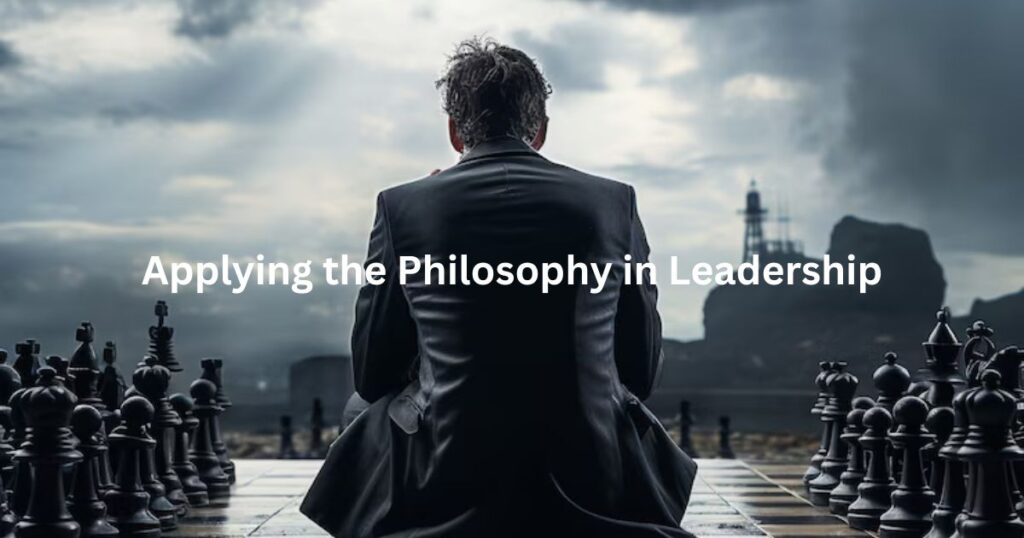
For those in leadership positions, this philosophy can be transformative. Fearless leaders who respect their team members create environments where:
- Innovation thrives because people aren’t afraid to share ideas.
- Feedback flows freely, leading to continuous improvement.
- Team members feel valued and motivated to give their best.
- Conflicts are resolved constructively, strengthening team bonds.
Leading by Example
As a leader embodying this philosophy, you set the tone for your entire organization. Your fearlessness in facing challenges head-on and your respect for every team member, regardless of their position, creates a powerful ripple effect.
The Impact on Mental Health
Adopting this mindset can significantly improve your mental health. When you’re not constantly worried about others’ judgments or trying to please everyone, you free up mental energy for more positive pursuits.
Respecting yourself and others also contributes to a sense of inner peace and contentment. It reduces the stress that comes from unnecessary conflicts and the anxiety of constantly comparing yourself to others.
Overcoming Social Anxiety
For those struggling with social anxiety, this philosophy offers a path forward. By focusing on respecting others rather than fearing their judgment, social interactions become less daunting. Remember, respect doesn’t require you to be perfect or to please everyone – it’s about treating others with dignity while being true to yourself.
Fostering Creativity and Innovation
When you fear no one, you’re more likely to think outside the box and propose unconventional ideas. Coupled with respect for diverse viewpoints, this fearlessness can lead to breakthrough innovations in any field.
In creative pursuits, this mindset allows you to:
- Take artistic risks without fear of criticism.
- Collaborate effectively with others, respecting their creative input.
- Push boundaries and challenge norms in your field.
Nurturing Personal Relationships
In personal relationships, this philosophy can deepen connections and resolve conflicts more effectively.
By approaching relationships without fear, you can:
- Be more vulnerable and authentic with loved ones.
- Set healthy boundaries without guilt.
- Express your needs and feelings openly.
Respecting your partner, friends, and family members means:
- Valuing their opinions and feelings, even when they differ from yours.
- Supporting their goals and dreams.
- Practicing active listening and empathy.
The Journey, Not the Destination
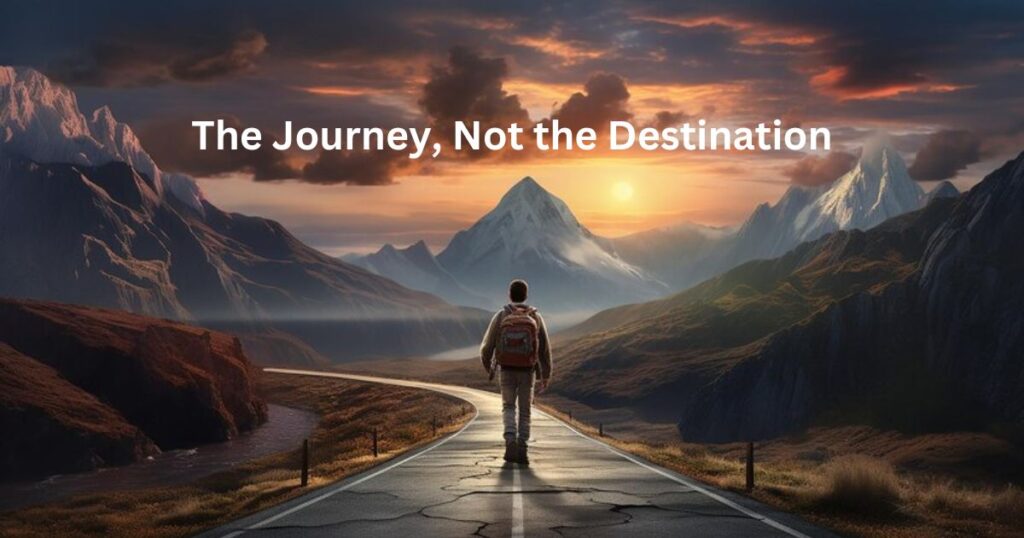
Remember, embodying this philosophy is a lifelong journey. There will be days when fear creeps in or when showing respect feels challenging. That’s okay. What matters is your commitment to the principle and your willingness to learn and grow.
Each day offers new opportunities to practice fearlessness and respect. Whether it’s speaking up in a meeting, trying a new hobby, or navigating a difficult conversation with a loved one, approach these moments with courage and kindness.
As you continue on this path, you’ll likely notice positive changes in various aspects of your life. Your relationships may become more fulfilling, your career more rewarding, and your sense of self more grounded.
Read Also These:
Wentworth Miller 2024 Partner: Unveiling The Personal Life Of The Iconic Actor
Revo Technologies in Murray, Utah: Pioneering Local Innovation for Global Sustainability
FAQ’s
What does fear no one but respect everyone mean?
It means being confident and unafraid while treating everyone with dignity. This philosophy encourages inner strength and universal respect, regardless of a person’s status or behavior.
What does trust no one but respect everyone mean?
This saying advises caution in relationships while maintaining basic courtesy towards all. It suggests being wary of others’ intentions, but still treating everyone with fundamental respect and decency.
Who says respect all fear none?
The exact origin is unclear, but it’s popular among motivational speakers and on social media. It’s often used by those promoting personal empowerment and positive social interactions.
Where does respect all fear none come from?
The phrase likely evolved from concepts in philosophy, religion, and martial arts traditions. It has gained recent popularity through social media and motivational content, resonating with those seeking a balanced approach to life’s challenges.
Conclusion
Ever feel like life’s a tightrope between being tough and being kind? Tymoff’s quote “I fear no one, but respect everyone” might just be your new life hack. It’s not about being a superhero or a pushover. It’s about finding your inner strength while treating everyone with basic decency.
Imagine walking into a room, confident but not cocky, friendly but not fake. That’s the sweet spot. This mindset can transform your relationships, boost your career, and seriously upgrade your personal growth game.
It’s not always easy, but it’s worth it. You’ll face challenges head-on, connect better with people, and create a positive ripple effect around you. Ready to give it a shot?

Hello, I’m Harry James an author at LatestNexGen, where I delve into the latest trends across Tech, Lifestyle, Business, Sports, News, Science, and Fitness. My articles provide insightful and engaging content, adeptly simplifying complex ideas for a broad audience. Follow me on LatestNexGen.com for fresh perspectives and updates on the most current and relevant topics.

